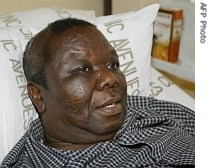2007年VOA标准英语-Beatings and Abductions Continue in Zimbabwe(在线收听)
Harare
07 May 2007
After the high-profile police beating of senior opposition politicians in March, state-sponsored political violence in Zimbabwe is now targeting mid-level opposition activists and ordinary citizens who are being dragged out of their homes, and beaten, mostly at night in Harare's high-density suburbs. Peta Thornycroft reports that doctors, lawyers and opposition political leaders describe it as a terror campaign perpetrated by state security agents against opponents of President Robert Mugabe.
Every morning, victims of political violence are showing up for treatment in various doctors offices in Harare.
 |
| Zimbabwean opposition leader Morgan Tsvangirai is seen in bed at a local hospital in Harare, 14 Mar 2007 |
One doctor, who asked not to be identified, said he had never seen so many victims of severe beatings in his career as a private medical practitioner in Harare.
Victims of political violence say they are unable to seek help at public health facilities, as they have to produce a certificate from the police about the cause of their injuries before they can be treated. This was confirmed by State Security Minister Didymus Mutasa in a telephone interview with VOA.
"Because the police would have been called in and the hospitals here do not treat cases like that without reference to the police," he said.
Many of the victims are officials of small branches of the opposition Movement for Democratic Change, but some have told doctors they have no political affiliation.
University of Zimbabwe senior political analyst Eldred Masunungure says the ruling Zanu-PF has embarked on a two-pronged strategy. The first, he says, is designed to soften up or neutralize the opposition Movement for Democratic Change in advance of the Southern African Development Community's mission to bring ZANU-PF and opposition groups to the negotiating table before national elections next March.
Masunungure adds that Zanu-PF is in election mode and on what he described as a war footing. He says Zanu-PF has always used violence as an instrument of persuasion.
Alec Muchadahama is a lawyer who handles many of the political detentions in Harare. He has regularly brought cases of severe beatings suffered by his clients in police custody to the attention of the courts.
He says political repression, especially beatings, has never been worse with daily arrests of people he believes are on a police list of opposition members.
"Apart from those they have arrested and taken to court, there are also those who police are simply abducted during the night and taken to far off places in the bushes and assaulted thoroughly - leave them for dead in the bushes," he said. "And some of them are taken to police stations where they are also seriously tortured and simply released."
Muchadahama and others have told VOA that some people abducted from their homes at night disappear, and no one knows whether they are dead, in hiding, or have fled to South Africa.
State security minister Didymus Mutasa denies the government has been beating people up in the townships. He told VOA the victims are lying about the attacks.
"There is nobody who is being beaten. Please do not make me angry," he said. "I am telling you again and again that there is nobody who is being beaten, but you are telling lies."
Victims of violence say they are not always sure which branch of the state's extensive security machinery is responsible for the ongoing reign of terror in the townships. But different individuals have identified the Central Intelligence Organization; the military police; or, youth militia loyal to Zanu-PF as being responsible for their abuse.
The government accuses the opposition of engaging in terrorism and says the MDC is responsible for 11 petrol bomb attacks, mostly in Harare, since March 15. The majority targeted police stations and Zanu-PF owned homes in the high-density suburbs.
The MDC denies the allegations; but 31, mostly senior members of the MDC, are now in prison awaiting trial on terrorism charges. Lawyer Muchadahama said the only evidence the police have produced so far are some confessions he says were extracted under torture. He adds that the arrests are political.
"Because the police are saying on a daily basis they want to carry out raids in an attempt to arrest would be saboteurs but in this process they are going for any person who they suspect is an MDC sympathiser or activist and is treating them in the manor I have described," he said.
Shortly after the interview with the VOA, Muchadahama and a colleague, Andrew Makoni were detained and held at Harare Central Police Station. The Harare High Court ruled on Saturday they should be released immediately.